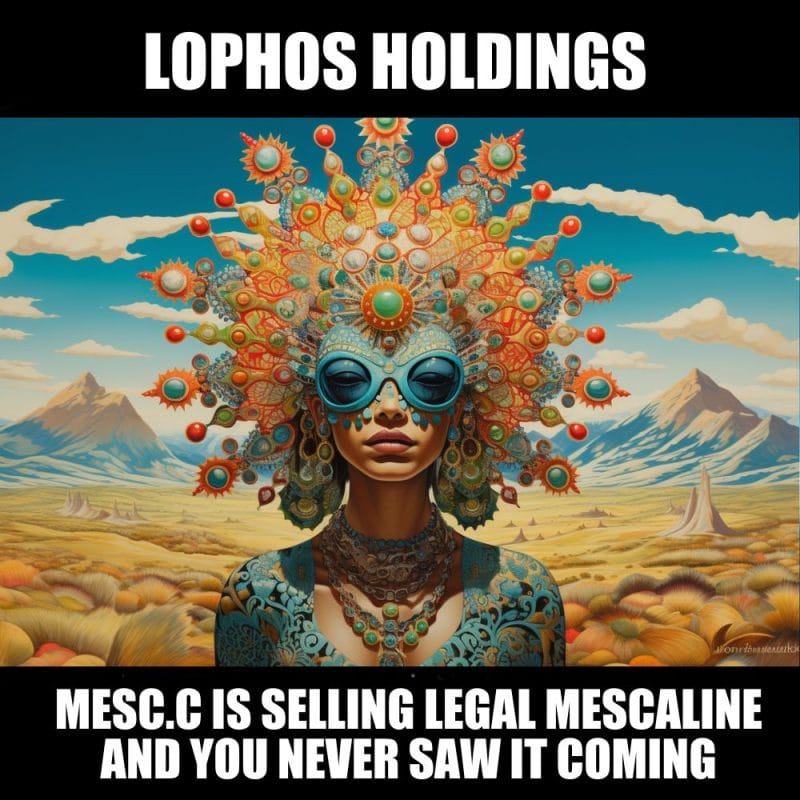Lophos Holdings (MESC.C) is a Canadian public company – the only public company – specifically focused on the quickly liberalizing psychedelics sub-sector of Peyote and Mescaline.
You may be sitting back in your chair now thinking, “Well hello there,” and I’m with you. For most of my life, peyote was a thing we did with ‘shamen’ who were exotic dancers or food co-op employees by day and mystical Third Beach drum circle enthusiasts by night.
If you managed to find one with some sort of indigenous background – jackpot! But usually you didn’t. Usually it was a girl from West Van named Sarah with unfortunate tatoos and piercings in places that seemed really uncomfortable if you got a head cold, and who only took cash.
Well that’s the old peyote scene. What’s coming soon, it would appear, is a corporate-friendly, dose-consistent, Health Canada licensed, mass-grown, indigenous-involved group that fully expects the laws to keep advancing towards mainstream use and will be there waiting when they do.
Also though, it’s worth noting that peyote is legal in Canada, under certain exceptions.
No, they’re not about to sell it next to the Flintstone Vitamins. But if you have a medical exemption (ask your therapist or doctor), or you’re an indigenous person, you’re able to sign up, like, NOW to buy directly, legally, from Lophos in 2024.
Why not now? Because they’re growing as many as they can get their hands on, so they can have a consistent supply from day one, and peyote cacti don’t grow quickly.
Essentially, Lophos has learned from the mistakes of the cannabis sector that just tossing out a baggie and hoping the world will beat a path to your door ain’t it.
MARKET SIZE: MORE THAN YOU THINK
“That seems like a small market,” I remark to Lophos CEO Claire Stawnyczy, who replies, “Nope, that’s a sizable market of people who, right now, struggle to find what they need, let alone what they want. We can do great business without straying outside our legalized lane.”
That’s a good point. After all, it’s a cactus, and doesn’t require a lot to grow, other than knowledge and care.
One thing it does take is time – sometimes as much as seven years – though Lophos thinks they’ve got that under control and, with the right environment, can possibly cut that into a quarter.
But that delay is all up front; once the cactus is harvested, it can be reharvested soon after without having to start from scratch, unlike weed.
Here are the details:
- Key License Acquired: Lophos secured a critical license from Health Canada allowing it to handle controlled substances, specifically mescaline, psilocin, and psilocybin.
- Specialized Facility: Lophos owns a new 10,000-square-foot facility in Napanee, Ontario, with advanced labs and secure storage, valued at $6.25 million.
- Cultivation and Research Space: Has 6,000 square feet specifically for growing peyote cacti and conducting related research.
- Expert Partnership: Obtained the license efficiently thanks to Canalytica Corp., an expert in regulatory matters.
- Research Focus: Lophos is focusing on exploring how psychedelic medicines can treat mental health conditions like depression, PTSD, and anxiety, and engaging in research currently.
- Commitment to tradition, sustainability and research: Lophos is focused on combining traditional psychedelic medicine practices with reinvestment into research while keeping true to traditional roots and expertise, as well as compliant, ethical, and sustainable indoor cultivation.
- Early Enrollment for Sales: Lophos has begun early enrollment for customers interested in purchasing peyote cactus, with the product release set for 2024.
- Legal Compliance: Sales are legal in Canada under specific exemptions, and Lophos will prioritize indigenous individuals and those with medical recommendations.
- Safety and Standards: The company promises that its peyote products will adhere to Health Canada’s rigorous standards for controlled substances, ensuring safety and responsibility.
Since it arrived on the financial markets, Lophos hasn’t rocked the world with its share price, but nobody at the helm is overly bothered with that right now. This is a growth and scalability story that, as of now, operates in a niche market that can keep the doors open, without having to max out its spend on operations and infrastructure. Their facility cost someone else a lot more to build than it cost them to buy, they’ve sourced their growth materials and licensing already, and as the laws continue to trudge their way to an eventual bigger market, Lophos can just quietly chug along, with psilocybin and psilocin as a nice little earner along the way.
“Are we going to make millions overnight? Not at all,” says Stawnyczy,” but that’s not the model. We’re the first ones here, we’ve earned Health Canada’s trust, and there’s lots of scope to do good business while we plant the seeds, no pun intended, for a bigger business down the road. Patience will be key, but our motivation right now is to learn from the mistakes of those who came before us, both in the industry and our ancient culture.”
Right on. Good place for a nibble, before the masses start copying.
— Chris Parry
FULL DISCLOSURE: Lophos is an Equity.Guru marketing client


Leave a Reply